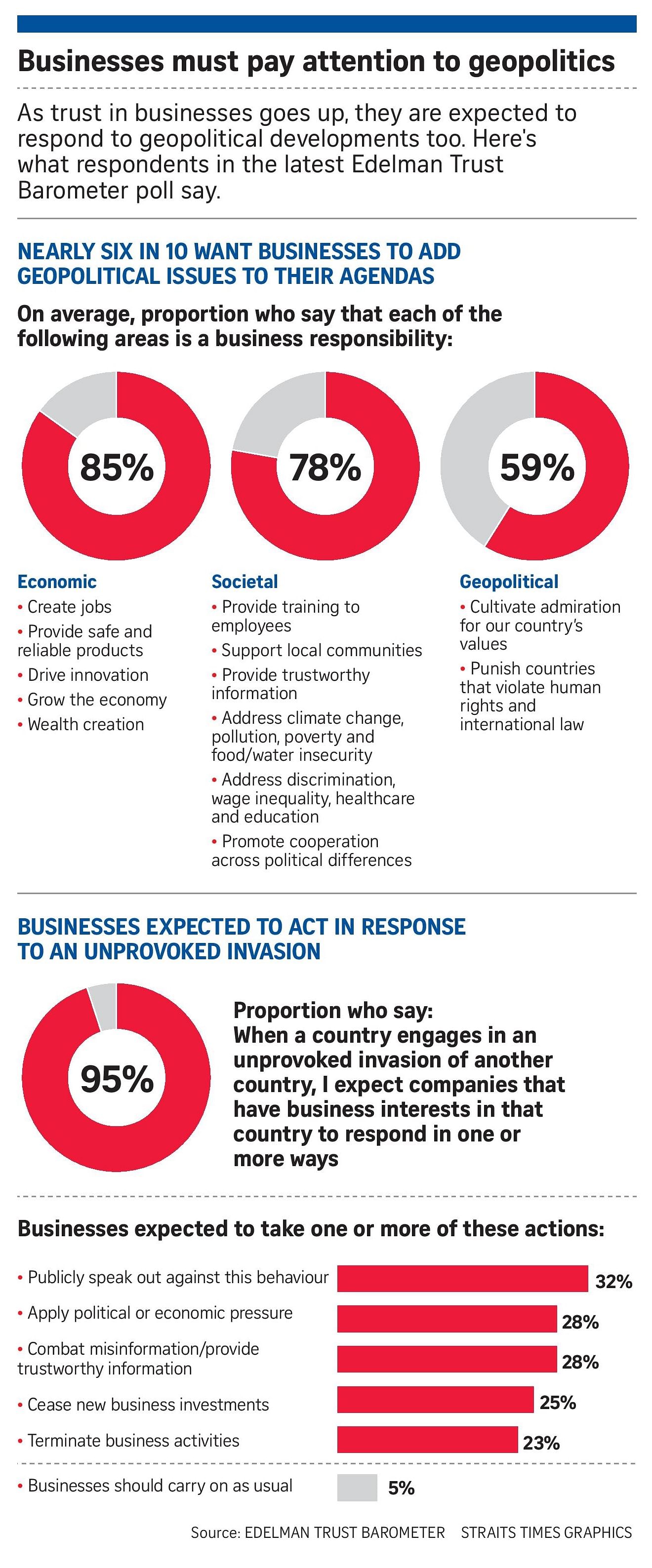Ukraine crisis moves geopolitics to front of business agenda: Edelman survey
Sign up now: Get ST's newsletters delivered to your inbox

Russia's invasion of Ukraine has moved geopolitics to the front and centre of the business agenda, the latest survey shows.
PHOTO: REUTERS
Follow topic:
DAVOS - Doing business was about providing a service and meeting the needs of consumers, and by doing so effectively over time, companies have gained more trust from people than governments, non-governmental organisations and the media have.
Today, while people still see the key responsibility of business as contributing to the economy and societies, businesses are adding geopolitics to their list of responsibilities as well.
This was one of the key findings of the latest Edelman Trust Barometer poll released at a breakfast briefing in Davos, on the opening day of this year's World Economic Forum annual meeting on Monday (May 23).
Russia's invasion of Ukraine has moved geopolitics to the front and centre of the business agenda, the latest survey shows.
People are now evaluating where a company operates and what actions it takes in situations of conflict, and there is support for business activism in geopolitics, the audience was told.
Nearly 60 per cent of respondents in the poll said geopolitics is now a top priority for business.
Nearly every respondent (95 per cent) said they expect businesses to act in response to an unprovoked invasion, and this could take the form of exerting political or economic pressure, or publicly speaking out against the aggressor.
Almost half (47 per cent) of the respondents said they had bought or boycotted brands based on the parent company's response to the invasion of Ukraine.
Edelman's report, The Trust Barometer Special Report: The Geopolitical Business, follows its survey of 14,000 respondents from 14 countries in the past month.
Introducing it to a select group of people, the global communications firm's chief executive Richard Edelman said the ability of businesses "to get things done has led to an increasing reliance on business, not government, as the primary actor on societal issues, from sustainability to diversity and inclusion to human rights, to wage levels and reskilling".
"The Russian invasion of Ukraine has now added geopolitics to the list of business priorities," he added.
"The exit of 1,000 companies from the Russian market in the three months since the invasion is also evidence of the new values standard for business, expected to be an ethical participant in society."
Mr Edelman's opening remarks to the audience sparked a lively debate among panellists over the implications of the findings and what they would mean for companies' dealings, and for the West with China.
Discussions also touched on inequity in society and the need to do more to uplift the living conditions of the poor, boardroom discussions on evolving corporate values, and related issues.
Singapore's former diplomat Kishore Mahbubani, who joined a group of panellists for the discussion, took up differences between how the West perceives China and Asia's view of its neighbour.
China's rise is a natural return, and most of Asia is realising that China is their most important neighbour and integration efforts are under way, he said.
So, if the West tries to decouple from China, it would be decoupling from a wider region, he noted.
Former Denmark prime minister Helle Thorning-Schmidt cautioned about a clash of values coming up between different civilisations, and reminded the audience of the imperative of universal values that support human rights and democracy.
Edelman's survey also showed that employees are more willing to recommend their employer if the company has suspended its business in Russia.
The poll showed that companies can garner a huge net increase of 30 points in trust by ceasing operations in Russia. The reverse was also true. Those continuing to operate in Russia are at risk of a net loss of 38 points in trust, the poll showed.


